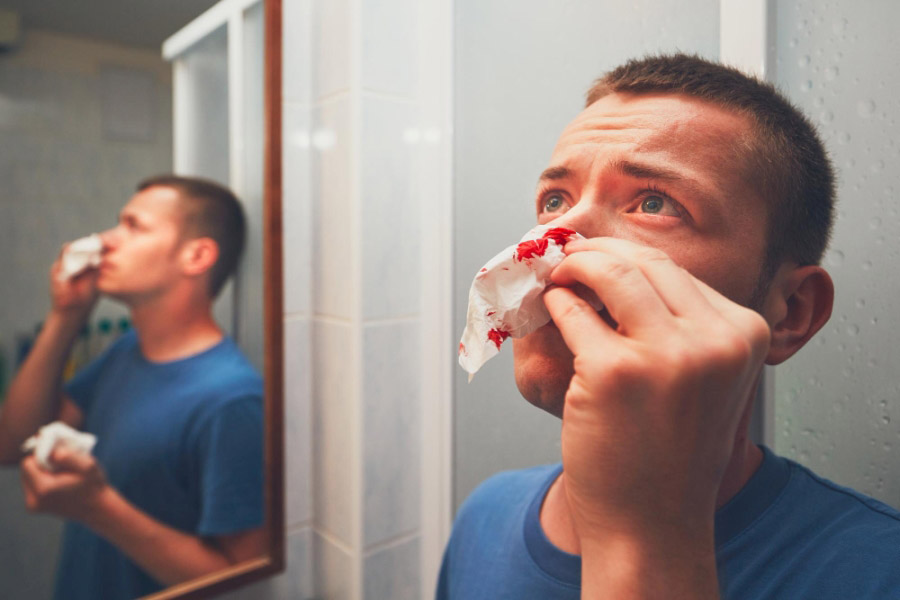When you’re frequently experiencing nosebleeds or having them begin shortly after drinking alcohol, it can bring up a lot of concerns about the cause. Can alcohol cause nosebleeds, or is it something else that’s contributing to the problem?
Our team at Genesis House is here to help you make educated decisions for your health and well-being. This article will break down the effects of alcohol on the body, the relationship between alcohol and nosebleeds, and other potential causes to help you determine what’s happening. Read on for all the details.
Can Alcohol Cause Nosebleeds?
Yes, alcohol can cause or contribute to nosebleeds. You can experience alcohol-related nosebleeds shortly after drinking, or they may occur frequently due to regular excessive alcohol use.
A study published in the British Medical Journal assessed 140 patients who were admitted to the emergency room for nosebleeds. 63 (45%) of the patients reported that they were regular drinkers and had consumed alcohol within 24 hours of admission, showing a significant link between alcohol and nosebleeds.
Another analysis from the Journal of Alcohol also found a significant link between nosebleeds and alcohol across many clinical trials. There was a risk of nosebleeds at all doses of alcohol consumption, including low, moderate, and heavy alcohol use. However, the risk of nosebleeds was the greatest with regular heavy alcohol use.
The Role of Alcohol in Blood Vessel Dilation
The main reason why alcohol can contribute to nosebleeds is because it’s a vasodilator, meaning it widens the blood vessels. Therefore, alcohol will pass through the blood vessels faster and make it harder for the blood to clot if a nosebleed starts.
The blood vessels in the nasal passages are especially delicate, so having more blood flowing through them at a faster rate can make it more likely that they’ll rupture and start bleeding.
Dehydration and Dry Nasal Passages
Aside from alcohol’s blood vessel effects, dehydration can be another possible cause.
Alcohol is a diuretic, meaning it increases urine production and causes more fluids to leave the body than you’re taking in. That effect can cause dehydration.
Dehydration can be a contributing factor to nosebleeds since it dries out the tissues in the nasal passages, making them more susceptible to cracking and bleeding. Alcohol dehydration symptoms can worsen when someone is continuously drinking high amounts that contribute to more and more dryness.
Liver Function and Blood Clotting
Alcohol’s effects on the liver and the body’s blood clotting capabilities can also contribute to more frequent nosebleeds.
A study from the Journal of Translational Science found a strong link between alcohol-related liver disease and increased bleeding.
The liver plays a big role in the body’s blood clotting system. When the liver is damaged by alcohol, it makes it harder to stop bleeding when it occurs. That combined with alcohol’s effects as a vasodilator can make nosebleeds much more common and harder to stop when they begin.
Additional Risk Factors
When alcohol use is combined with other risk factors, it can make nosebleeds more likely.
Medications and Alcohol
Certain medications can make nosebleeds more common when combined with alcohol. Common medications that could have this risk include:
- Over-the-counter painkillers: Some over-the-counter painkillers like Ibuprofen and Aspirin will thin the blood, making it flow even faster through blood vessels when alcohol expands them.
- Prescription blood thinners: Prescription blood thinners like Warfarin and Xarelto will also make blood clotting harder and cause faster blood flow after drinking alcohol.
- Nasal decongestants: Certain nasal decongestant sprays like Afrin will dry out the nasal passages, which can increase the risk of bleeding when combined with the drying effects of alcohol.
- Antidepressants: Some case studies link antidepressants such as sertraline and paroxetine to an increased risk of nosebleeds. Those effects can worsen after drinking alcohol.
Pre-Existing Health Conditions
Some health conditions can make nosebleeds more common.
For example, high blood pressure can damage blood vessels in the nose and make them more prone to bleeding.
Pre-existing liver and kidney diseases can also affect the body’s blood clotting capabilities and make nosebleeds more likely.
Additionally, blood clotting disorders like hemophilia can impair the body’s clotting and make bleeding more likely after drinking alcohol.
Environmental Factors
Being in different environments can make you more susceptible to nosebleeds too.
For example, cold air in the winter will dry out the nasal passages and make nosebleeds more common. Alcohol’s dehydrating effects can worsen that.
High altitude, where the air is drier and thinner, will also have a similar effect that makes nosebleeds more likely.
How to Prevent Alcohol-Related Nosebleeds
What can you do when alcohol is causing or contributing to nosebleeds? Here are some tips that can help:
- Reduce alcohol intake: Limit your alcohol use throughout the week and on days when you decide to drink. The more you drink, the more susceptible your body becomes to nosebleeds. Additionally, watch for signs of alcohol addiction if cutting back feels hard to manage.
- Stay hydrated: Make sure you drink enough water on days when you drink and throughout the week. It can help to try to drink one glass of water for every alcoholic beverage you have to both limit alcohol intake and prevent dehydration.
- Managing environmental factors: Watch for the effects of your environment, such as drier conditions in the winter or when you travel somewhere with higher elevation. It can be a good idea to cut back on drinking and use nasal moisturizing gels and sprays to prevent nosebleeds caused by dryness.
When Should You Be Concerned?
Common signs that you should talk to your doctor about your nosebleeds to check for underlying health concerns are:
- Frequent nosebleeds: If you’re having them more than once per week, it’s a good idea to talk to a doctor to see what the cause might be.
- Bleeding that won’t stop: When bleeding won’t stop after 15-20 minutes, it can be a sign of underlying issues causing blood clotting problems.
- Bleeding that drains down the back of your throat: A nosebleed like this is usually severe and requires medical attention.
- Experiencing other symptoms along with nosebleeds: When your nosebleeds are accompanied by other symptoms like weakness, dizziness, shortness of breath, or lightheadedness, it may be a sign of a more serious problem.
Alcohol abuse is a common cause that can contribute to severe nosebleeds, so watching for signs of addiction is essential when alcohol abuse and nosebleeds seem related.
Warning Signs of Alcohol Misuse
Here are some common warning signs to look for when you think alcohol abuse may be contributing to frequent nosebleeds:
- Continuing to drink alcohol or struggling to cut back despite negative consequences like continuous nosebleeds or other health conditions
- Having withdrawal symptoms after stopping alcohol use
- No longer participating in activities once enjoyed or isolating to cover up alcohol use
- Financial, relationship, work, school, or legal problems arising because of alcohol use
- Consistently feeling preoccupied thinking about drinking or finding alcohol
If you or a loved one is showing any of these warning signs, looking into alcohol addiction treatment options is a good idea.
Getting Help for Alcohol Use
When frequent alcohol use is contributing to nosebleeds and other health conditions, it can be a sign from the body that alcohol use is getting out of control and proper treatment is necessary. Reaching out to a drug and alcohol treatment center is a great first step toward recovery.
Our team at Genesis House can help with alcohol addiction treatment that’s tailored to your needs. We work with each patient individually to diagnose alcohol addiction, identify co-occurring disorders, and recommend treatment options that best suit your needs.
The treatment process often begins with a medical detox to safely manage withdrawal symptoms as alcohol leaves your system. Our treatment team would pay close attention to any health concerns in the process.
After detox, it’s a good idea to complete a full inpatient or outpatient treatment program consisting of therapy, skill building, and relapse prevention planning to ensure long-term success. All our treatment options are evidence-based, and you’ll have our supportive treatment team by your side each step of the way.
You don’t have to face alcohol’s effects on your health alone. Contact us today to schedule a free consultation or learn more about our treatment options.
References
- McGarry, G. Relation between Alcohol and Nosebleeds. British Medical Journal, https://www.bmj.com/content/309/6955/640
- Askgaard, G., et al. “Alcohol and Risk of Non-Traumatic Bleeding Events Requiring Hospital Care in the General Population: A Prospective Cohort Study.” Alcohol, vol. 87, May 2020, doi:10.1016/j.alcohol.2020.04.009. https://www.sciencedirect.com/science/article/abs/pii/S0741832920302251
- Flores, Brisas, et al. “Hemostasis, Bleeding and Thrombosis in Liver Disease.” Journal of Translational Science, vol. 3, no. 3, 2017, doi:10.15761/jts.1000182. https://pmc.ncbi.nlm.nih.gov/articles/PMC6136435/
- AlJhani, Sumayah A. “Escitalopram-Induced Epistaxis: A Case Report.” Journal of Taibah University Medical Sciences, vol. 16, no. 6, 1 Dec. 2021, pp. 938–942, doi:10.1016/j.jtumed.2021.06.004. https://www.sciencedirect.com/science/article/pii/S1658361221001311






